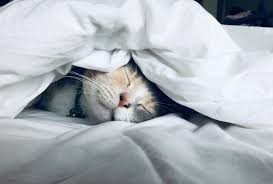More Zzz’s, Please!
If you’re like me, and you’re reading this in the morning before your first cup of coffee, you may feel a little groggy and bleary-eyed. We all know it’s really common to have trouble getting moving in the morning. However, if those morning cobwebs don’t shake off during the day, you might not be getting enough sleep, which can lead to a number of chronic conditions. It may not seem intuitive, but the first and most critical step to good health is good sleep. After many years of practicing medicine, I’ve come to realize that I am not a primary care doctor, but a sleep doctor. Ask any cat – they know sleep is the foundation of good health.

Poor sleep can lead to a multitude of negative outcomes, including type 2 diabetes, obesity, hypertension, strokes, heart attacks, depression, anxiety, cancer, dementia, car accidents…you get the point. The majority of chronic health issues in this country can be tied back to poor sleep. Poor sleep may even impact your salary (you can find out more about this in the link below).*
And we know why this happens. Ten thousand years ago, before the internet and late-night TV, the only reason to stay up at night was to search for food if you didn’t find any during the day. So our bodies have evolved to go into starvation mode when we are sleep deprived. Our metabolism slows down, we become hungrier, we crave fatty foods, we hold onto calories more efficiently, and we create more stress hormones such as cortisol, so our blood sugar goes up. We also think less clearly when we’re tired, so we’re more likely to make bad choices. For one or two nights, sleep loss is no big deal. But chronic sleep deprivation wreaks havoc on our system.
Most importantly, when you get enough sleep, you feel better! You have more energy, more motivation, less hunger, a better memory, and likely more enjoyment of life. The average adult needs seven to nine hours of sleep per night, which means that at least half of us need eight hours or more. If you’re awake doing work or taking care of your kids, then sleep has to take a back seat. But if you’re watching “Friends” reruns or searching Facebook, you need to turn the screens off and go to bed. Sleep may not seem as interesting as Ross & Rachel, but the payoff of a better, healthier life is certainly worth it. Essentially, we all have a limited number of waking hours in our lives, so you don’t want to use them all up early!
Here’s some tips to make adequate sleep more likely:
⧫Set an alarm to sleep in addition to your alarm to wake. We all get tired late at night, so we’re more likely to make bad choices, like staying up and doing a worthless activity. A reminder such as an alarm for sleep can help nudge you to do the right thing.
⧫Cut down your alcohol intake. Alcohol can make it easy to fall asleep, but if you wake at 2 am every night, it may be due to the alcohol wearing off. Plus, alcohol interferes with the quality of our sleep. Try drinking on weekends only (you’ll probably feel better!).
⧫Limit caffeine to the morning only.
⧫Keep regular sleep and wake times, including weekends, so your body gets used to a set schedule. You will also have better sleep quality by doing this.
⧫Put your TV or computer on a timer so it turns off near bedtime.
⧫Make sure your bedroom is dark, and that your bed is comfortable and inviting.
⧫Get your spouse/significant other to be on the same sleep schedule as you (good luck!).
And finally…
⧫GET THE TV AND COMPUTER OUT OF YOUR BEDROOM!!! This may seem extreme, and could lead to the threat of divorce in some marriages, but this is really important. Screens disrupt melatonin release, and confuse your body into thinking the bedroom is for entertainment, not rest. Plus, news, emails, and other reminders of a stressful daily life are part of the reason you may not be sleeping in the first place, and need to be avoided before bed.
Remember, you can’t catch up on sleep over the weekend, and it may take weeks or months before you start feeling fully rested again, so be patient! It will be worth it in the long run.
And now I’m off for a nap. Good night, and good health!
* https://www.nytimes.com/2019/11/04/upshot/sleep-can-be-good-for-your-salary.html

